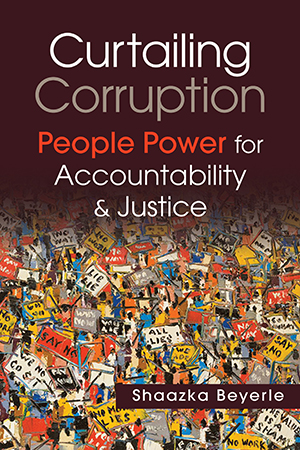Curtailing Corruption:
People Power for Accountability and Justice
Shaazka Beyerle
How do citizens counter corruption and exact accountability from power holders? What strategic value does people power bring to the anticorruption struggle? Can bottom-up, citizen-based strategies complement and reinforce top-down anticorruption efforts?
Addressing these questions—and demonstrating the critical role of grassroots efforts in the anticorruption/accountability equation—Shaazka Beyerle explores how millions of people around the world have refused to be victims of corruption and become instead the protagonists of successful nonviolent civic movements to gain accountability and promote positive political, social, and economic change.
Shaazka Beyerle is senior research adviser in the Program on Nonviolent Action at the United States Institute of Peace and senior adviser at the International Center on Nonviolent Conflict.
Also of interest:
The Self-Restraining State: Power and Accountability in New Democracies, edited by Andreas Schedler, Larry Diamond, and Marc F. Plattner
"This is a truly engaging and fascinating read.... Highly recommended."—Choice
"A welcome tonic, one guaranteed to give even the most hard-bitten, cynical anticorruption fighter a lift."—Rick Messick, The Global Anticorruption Blog
"The lesson from Curtailing Corruption is that citizen action can be a powerful force anywhere. There is much to be learned from this pioneering book."—Brian Martin, openDemocracy
"[Beyerle establishes] a solid base of evidence that citizen-led engagement can reduce corruption, improve accountability, and build more honest government.... Thanks to the clarity of case studies, the writing style of the author and her practical recommendations, this book is recommended reading for everyone seeking to invest in citizen-led anti-corruption efforts."—Joy Saunders, The World Today
"An insightful and very timely book for the global anticorruption community, examining the power of people taking social and corruption issues into their own hands."—Roberto Perez Rocha, Transparency International
"This well researched, perceptive book constructs an important international discourse on governance. Democracy has come of age with right-to-information and anticorruption movements in the global south. Shaazka Beyerle demonstrates that, in unpacking centers of power, transparency ensures accountability in governance."—Aruna Roy, cofounder of India's Right to Information movement and Ramon Magsaysay Award laureate
"A rare work with insights for generations to come. When, as Beyerle writes, 'citizens join in raising their voices and use their collective power to fight corruption,' the countries of Africa and indeed most countries will be free."—Hauwa Ibrahim, human rights lawyer and Sakharov Prize laureate
"Curtailing Corruption is a hopeful book—showing how citizen engagement can produce real reform. It is also a practical book—explaining how mobilization happens and groups strategize. Its lessons ought to be learned by reformers worldwide. Positive change will not occur without patience, persistence, organization, and a willingness to take risks. There are no quick fixes."—Susan Rose-Ackerman, Yale University
"Outstanding.... Beyerle has done groundbreaking work. Making use of the latest and most robust research, as well as her own on-site case studies, she makes a unique, innovative contribution to the literature."—Tom Hastings, Portland State University
"Extremely valuable ... fills a major hole in the research on nonviolent action and civil resistance. This should become a major (possibly landmark) resource for all of us interested in the subject."—Cynthia Boaz, Sonoma State University
- Introduction.
- Corruption, People, and Power.
- Approaches to Curbing Corruption.
- Blacklisting Corrupt Candidates: Korea.
- Digital Resistance for Clean Politicians: Brazil.
- Citizens Protect an Anticorruption Commission: Indonesia.
- Nonviolent Resistance Against the Mafia: Italy.
- A Citizen Pillar Against Corruption: India.
- Community Monitoring for Postwar Transformation: Afghanistan.
- Curbing Police Corruption through Engagement and Disruption: Uganda.
- Highlights from Five Cases: Bosnia-Herzegovina, Egypt, Kenya, Mexico, and Turkey.
- What We Have Learned.
- The International Dimension.








